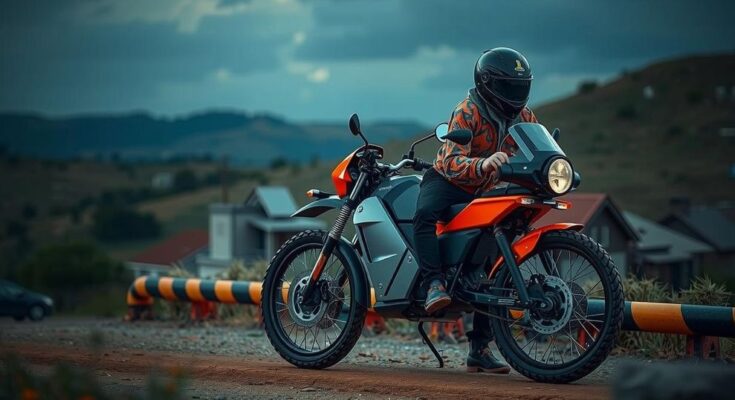A solar-powered electric motorcycle has successfully traveled 6,000 kilometers from Kenya to South Africa, demonstrating the viability of sustainable transport solutions in Africa. The collaboration between Stellenbosch University and Roam highlights the potential of solar energy in overcoming transport challenges on the continent while promoting environmental conservation. The journey concluded with the motorcycle’s donation to SU Electric Mobility Lab for ongoing research and development.
In an extraordinary accomplishment of engineering and endurance, a solar-powered electric motorcycle, meticulously designed and constructed in Africa, has successfully completed a remarkable journey spanning 6,000 kilometers from Nairobi, Kenya, to Stellenbosch, South Africa. The journey commenced on September 29, 2024, aiming to align the arrival with Transport Month in South Africa on October 16. The expedition traversed several countries, including Kenya, Tanzania, Malawi, Zambia, Botswana, and South Africa, highlighting the potential of sustainable transport solutions across the African continent. On the penultimate day, the team astonishingly covered 1,000 kilometers in a single day, culminating their journey at the southernmost point of Africa. This ambitious undertaking, a collaboration between Stellenbosch University (SU) and the Kenyan electric mobility enterprise Roam, signifies a crucial step in demonstrating the feasibility of electric mobility powered by renewable energy in Africa, particularly through the initiatives fostered by the SU Electric Mobility Lab. The Roam Air motorcycle was specifically engineered to withstand the unique conditions of the African terrain. The journey was undertaken by SU PhD candidate Stephan Lacock and Roam’s electric micromobility product owner, Masa Kituyi, who were supported by two vehicles. One of these support vehicles featured a battery bank and solar panels, functioning as a mobile charging station that exclusively relied on solar power for recharging the motorcycle’s swappable batteries. Such an innovative approach underscores the feasibility of utilizing renewable energy even in remote regions, thereby eliminating the reliance on traditional charging infrastructure. In a statement regarding the expedition, Professor Thinus Booysen, the founder of the Electric Mobility Lab, emphasized the journey’s broader implications, indicating that it went beyond merely reaching a destination: “This journey was not just about reaching a destination. It was about proving that we can create sustainable solutions for Africa’s unique challenges. The Roam Air performed admirably, highlighting the robustness of its design and the efficacy of this solar charging solution.” However, the journey was fraught with challenges, including mechanical issues, adverse weather conditions, and delays at border crossings. Professor Booysen remarked on the technical difficulties with solar connectors but noted that these were resolved through collaborative problem-solving. Along this route, the expedition afforded the team the opportunity to encounter Africa’s stunning landscapes and wildlife, affirming the need for environmental conservation. The successful completion of this journey has generated great enthusiasm in the electric mobility sector, demonstrating that world-class electric vehicles can indeed be produced in Africa. “This is a historic moment for Roam,” expressed Masa Kituyi. “It proves that we can build world-class electric vehicles in Africa, for Africa. The enthusiasm we encountered from local communities along the way was truly inspiring.” The motorcycles that completed this journey have been donated to the SU Electric Mobility Lab, where they will contribute to ongoing research and development focused on electric mobility solutions tailored to Africa’s specific needs. The lab will continue to advance initiatives aimed at facilitating the transition toward sustainable transport across the continent, addressing challenges such as charging infrastructure, operational efficiency, and the integration of electric vehicles into existing transportation systems. In conclusion, this monumental expedition not only showcases technological innovation but also reflects Africa’s vision for a cleaner and more sustainable future, reinforcing the potential for renewable energy to transform transport and livelihoods across the continent. As Professor Booysen posited, this journey highlighted the opportunity for electric mobility, powered by renewable energy, to drive substantial economic and social improvements for communities in both rural and urban settings. This remarkable achievement represents a significant leap forward in the realm of electric mobility in Africa.
The journey of the solar-powered electric motorcycle from Kenya to South Africa exemplifies the growing interest and investment in sustainable transport solutions across Africa. Initiated by Stellenbosch University in collaboration with Roam, this expedition serves as a catalyst for future innovations in the electric mobility sector, highlighting the importance of renewable energy and its application in challenging environments. The initiative aligns with Africa’s broader commitment to sustainable development and environmental conservation, showcasing the potential of homegrown technology in addressing local transport challenges.
The successful completion of the 6,000-kilometer journey by the solar-powered electric motorcycle symbolizes a significant milestone for electric mobility in Africa. It not only highlights the feasibility of using renewable energy for transport but also reflects the continent’s commitment to innovation and sustainability. This initiative serves as a beacon of hope, demonstrating that Africa can produce world-class electric vehicles that meet the unique challenges of its diverse landscapes, ultimately paving the way for a cleaner and more sustainable future.
Original Source: www.universityworldnews.com




